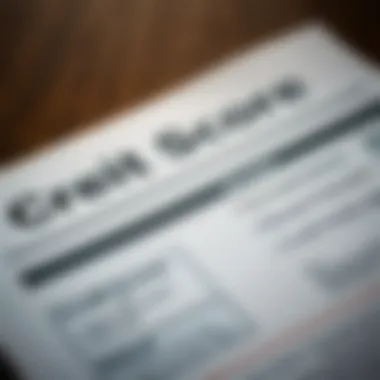Navigating Debt Settlement Decisions: A Complete Guide


Intro
When it comes to managing financial obligations, the landscape can be tricky, especially for those faced with debts sent to collections. This situation can feel like a dark cloud hovering over personal finance, often manifesting complex emotional and ethical dilemmas. The decision to settle such debts isn't merely about numbers; it involves understanding legal ramifications, the ripple effect on one’s credit rating, and even the psychological burden of outstanding liabilities.
Each financial journey is unique, and thus, exploring the nuances of resolving debts in collections demands a careful examination of several pivotal elements. From grasping what it means to have a debt in collections to recognizing potential negotiation tactics, this guide aims to equip you with the necessary tools for informed decision-making. Throughout this exploration, we will highlight vital terms, assess the long-term versus short-term impacts of settling debts, and entertain alternatives to the traditional pathways of debt resolution.
By digging deep into the intricacies of this subject, we seek to not just inform you, but empower you to navigate your financial landscape with greater clarity. Understanding your options could mean the difference between a weight lifted and a burden carried for far longer than necessary.
Prelude to Debt Collections
Navigating the world of debt collections can feel like wandering through a labyrinth. It's not just about owing money; it’s about understanding the implications that come with unpaid debts, how they evolve into collections, and what that means for your financial future. Grasping the fundamentals of debt collections is crucial for anyone in the throes of financial distress. This section aims to lay the groundwork, shedding light on why this knowledge is not just beneficial but necessary for informed financial decisions.
Debt collections happen when creditors, fed up with unpaid bills, assign the task of retrieving money owed to specialized third-party agencies. This situation can build anxiety. The implications stretch far beyond the immediate demand for payment. Both immediate and long-term consequences of unpaid debts need to be assessed. An insightful understanding of this topic not only equips individuals to handle their circumstances but also paves the way for coping strategies and negotiation techniques that can mitigate the stress often associated with financial turmoil.
Understanding Debt Collections
Debt collections begin when an outstanding account becomes overdue, triggering a series of events that can feel overwhelming. But it's not all doom and gloom; knowing the ropes can help one regain control over their financial situation. Once the debt hits a certain age or balance, creditors might hold their hands up and refer the matter to a collection agency. These agencies specialize in recovering funds, typically for a cut of what's collected.
In a nutshell, understanding debt collections involves the acknowledgment of the debt itself, the nature of the creditor-collector relationship, and the legalities that come into play. Knowledge about the collection processes can empower individuals to question practices and terms that may seem unjust or illegal. The more you know, the less you feel like a helpless player in someone else's game.
The Debt Collection Process
The debt collection process is like peeling an onion—there are layers to uncover, each bringing with it different emotions and revelations. It generally starts with a reminder from your original creditor, who may give you a chance to settle the outstanding amount directly. If ignored, your debt might be sold or assigned to a collection agency, who then takes over the hunt for payment.
Here’s a brief outline of the typical journey:
- Initial Contact: A collection agency will usually contact you through calls or letters, seeking payment.
- Verification of Debt: You have the right to request proof of the debt's validity, as you are not obliged to pay every claim.
- Negotiation: At this stage, you can attempt to negotiate the amount or set up a payment plan.
- Payment or Settlement: Should you agree to pay, it's critical to keep records of all agreements reached during negotiations.
- Resolution and Reporting: Once settled, the agency should report this to credit bureaus, but this doesn’t erase the stain left by the collection on your credit report.
Understanding each step helps to demystify what can sometimes feel like a daunting ordeal. Knowing what lies ahead prepares you better for tackling the situation, ensuring you navigate through it with more confidence.
"Knowledge is power. The more you understand about debt collections, the better equipped you are to protect yourself."
Resources like Nolo or Consumer Financial Protection Bureau can offer additional insights into your rights and responsibilities.
Equipped with this foundational knowledge, readers can move on to explore the depths of their financial situations, meticulously weighing the decision of whether or not to settle these debts.
The Impact of Debt on Financial Health
When navigating the often murky waters of personal finance, understanding the impact of debt on financial health is crucial. As debts pile up, they not only create immediate pressing issues but also sow the seeds for longer-term challenges that can affect a person's entire financial landscape. This section explores the various layers of debt's impact, equipping readers with the tools to discern how these financial obligations can shape their future.
Immediate Financial Consequences
The moment a debt enters collections, the repercussions can be likened to a domino effect that triggers a flurry of complications. First and foremost, there's the hit to one’s budget. Funds that could be allocated to savings, investments, or even necessary expenses become diverted to paying off these debts. This can lead to an unsettling feeling where each paycheck barely covers immediate obligations, leaving little room for financial cushion.
To illustrate, consider a scenario where someone owes a couple thousand dollars on a credit card. When the debt is handed off to a collector, the stress mounts—not out of thin air, but through the realization that now, financial strain will persist indefinitely. Not only does this add pressure, but it also typically comes with additional fees and interest charges, making the situation even graver.
Additionally, the potential for court actions looms large. A creditor may seek judgment against someone who has stopped paying, bringing about additional legal headaches. Here are some quick bullet points regarding immediate financial consequences:
- Reduced cash flow. Less money available for essentials or emergencies.
- Increased stress levels. Anxiety about finances can lead to mental health issues.
- Possible legal action. Facing court could incur even more costs.
- Communication issues. Constant calls and letters from collectors can lead to further anxiety.
Long-Term Financial Effects
Looking beyond immediate consequences, the long-term effects of debt on financial health can be even more daunting. Cumulatively, unpaid debts can lead to a tarnished credit score, which presents its own set of problems. A low credit score isn't just an abstract number; rather, it leads to higher interest rates on loans, higher insurance premiums, and might even affect job opportunities in certain sectors.
Moreover, debts in collections can put individuals into a cycle that feels like a financial quagmire. They might resort to high-interest loans to cover debts, leading to a perpetual state of reliance on borrowed funds. Essentially, what starts as a manageable sum can grow exponentially when compounded with fees and interest.
Some key long-term considerations include:
- Credit score decline. A poor credit rating makes it difficult to get favorable terms for future loans.
- Increased dependency on credit. Individuals may find themselves trapped in a perpetual cycle of debt.
- Potential for bankruptcy. In extreme cases, debts can lead someone to consider bankruptcy, affecting credit for years.
- Homeownership hurdles. Aspiring homeowners may find their dream delayed due to a strained financial background.


Understanding these impacts is essential in making informed choices about settling debts in collections. By grasping both immediate and long-term consequences, individuals can navigate their financial situations with greater awareness and strategically prioritize their next move.
Should You Pay a Debt in Collections?
The question of whether to pay a debt in collections can feel like a tangled web. It's a crossroads many face, and the decision holds varying implications for individuals, which stretch beyond immediate financial concerns. First and foremost, one must navigate this decision with a keen awareness of the potential impacts it can have on both credit standings and mental well-being. Addressing debts in collections isn't merely about clearing your financial slate; it is essentially about making informed choices that can echo through future financial situations.
Deciding to pay a debt in collections may provide immediate relief, but it carries more weight than just a monetary transaction. The essence of managing one’s finances is about balance and awareness—understanding how actions affect not only today but also the road ahead is crucial for long-term financial health. Delving into this, we look at some key factors that ascertain the right path forward.
Factors to Consider
When mulling over the prospect of paying a collection debt, certain elements require careful scrutiny. Here are some key points that should be part of that deliberation:
- Age of the Debt: Knowing how long the debt has been in collections can dictate actions. Debts can affect your credit score for up to seven years. If it's nearing that limit, it might be worth considering if payment is necessary.
- Impact on Credit Score: The specter of collections haunts credit reports. It's not just about lowering your score; making payment can help to rehabilitate your standing after the fact. It’s wise to investigate how much of a hit the score has taken and if paying would yield benefits.
- Financial Stability: Can you afford to pay this debt without harming your financial resources? It’s important to ensure that paying off this debt does not create further financial strain.
- Negotiation Power: Sometimes, collectors are willing to negotiate. If the debt is significant and you can prove hardship, this might be a leverage point. Negotiation could lead to a reduced payment, potentially relieving your obligation at a lower cost.
Assessing the Validity of the Debt
Before making any payments, it is prudent to assess the validity of the debt in question. The last thing anyone wants is to cough up money for a debt that might not actually be theirs. Here’s a rundown of how to approach this:
- Request Documentation: Collectors are required to prove that the debt is yours. That means you should ask for the original creditor's details and any payment history they have on record.
- Check Statute of Limitations: Debts have a lifespan! Many jurisdictions place a statute of limitations on how long a creditor can pursue a debt. Researching this can inform your decision on whether you need to pay or if it’s worth waiting it out.
- Credit Report Review: Perusing your credit report can shed light on the debt's history and any discrepancies, such as wrong amounts or unrecognized creditors. You can obtain your free credit report at websites like www.annualcreditreport.com.
- Consulting with Experts: If all else fails or if you feel overwhelmed, seeking advice from consumer advocacy groups or financial counselors can help. They can guide you through the legality and consequences of the debt.
Understanding the intricacies behind these decisions means you can avoid pitfalls and make choices that benefit you in the long run. Paying a debt can feel like a fresh start, but never jump into it without careful consideration of all angles.
Legal Implications of Paying Collections
Understanding the legal implications of paying debts in collections is crucial for anyone facing this challenging situation. When debts reach this stage, they can incur various consequences that are not only financial but also legal. A well-rounded grasp of your rights and the framework governing debt collection helps individuals make educated decisions regarding their debts.
Key Considerations:
- Knowing your rights can prevent potential exploitation by collectors.
- Understanding various regulations can guide your actions and protect you from illegal practices.
Understanding Your Rights
When debt collectors contact you, it’s vital to be aware of your rights. Under the Fair Debt Collection Practices Act (FDCPA), you have several protections. This law serves to regulate the behavior of debt collectors and safeguard consumers from any deceptive or abusive practices.
Some important rights include:
- Right to Information: Collectors must provide verification of the debt upon request. This means you can ask for a written statement detailing what you owe and to whom.
- No Harassment: Debt collectors are not allowed to harass you. They cannot call you at odd hours or use threatening language.
- Dispute Right: If you believe the debt is not yours, you can dispute it. After notifying the collector, they must halt collection efforts until they provide proof of the debt.
Grasping these rights is the first step toward regaining control over your financial situation. It’s also beneficial to keep records of all communications with debt collectors in case issues arise later.
The Role of Fair Debt Collection Practices
The Fair Debt Collection Practices Act is a cornerstone of consumer rights in the realm of debt collection. Adhering to this act ensures that all debt collectors play fair and stick to ethical practices. The law not only protects you but also encourages a more respectable industry standard.
Key aspects of the FDCPA include:
- Prohibition of Deceptive Practices: Collectors cannot misrepresent themselves or the amount you owe.
- Limitations on Contact: They must cease contact upon your request if you communicate that you prefer not to be contacted further.
- Legal Recourse: If a collector violates your rights, you can file a complaint with the Consumer Financial Protection Bureau or consider legal action against them.
The legal landscape surrounding debt collection can feel daunting, but knowledge is power. Recognizing your rights and understanding the FDCPA can pave the way to better outcomes in debt management.
For further information on your rights and responsibilities, you can visit the Consumer Financial Protection Bureau’s website. In addition, reviewing materials from reputable sources like Fair Debt Collection: Your Rights can help you clarify any uncertainties regarding debt collections.
Being informed not only adds to your confidence but can turn a stressful situation into a more manageable one. Understand your rights, leverage the tools provided by the law, and don’t hesitate to seek assistance when necessary.
Credit Score Considerations
Understanding the role of credit scores is critical when it comes to the decision about settling debts in collections. A credit score serves as a numerical representation of one’s creditworthiness, influencing everything from loan approvals to interest rates. If you think about it, your credit score can either open doors or slam them shut. It’s the way lenders gauge the risk of lending money to a borrower; therefore, being aware of how collections impact this score is vital.
Impact on Credit Report
When a debt is transferred to collections, it typically shows up on your credit report as a negative item. This can remain for up to seven years, which is a hefty weight on your financial standing. The presence of a collection account can drastically lower your credit score—often by 100 points or more, depending on your current credit profile. The worse the score, the more limited your options for borrowing will be, leading to higher interest rates or, worse yet, outright denials from lenders.


"A single collection can wreak havoc on your credit, but knowing how to navigate that storm can help you get back on solid ground."
How Collections Affect Your Credit Score
The mechanics of credit scoring vary between scoring models, but generally, collections are a major red flag for credit bureaus. Here’s a succinct rundown of how collections affect your score:
- Payment History: This is the most significant factor in your credit score, accounting for about 35%. Missed payments and collections can severely impact this.
- Amount Owed: Collectors may report the amount owed, affecting your score based on your overall credit utilization.
- Length of Credit History: If your collections have been open for a while, it can reflect poorly on your financial habits, potentially influencing future lenders.
- New Credit Accounts: Applying for new credit after a collection account has been filed can further decrease your score, as it signals more risk to lenders.
Settling a debt may not remove the collection from your report immediately, but it can change the status from “active” to “settled,” which is better than letting it linger as unpaid. Depending on the lender’s reporting, this can gradually improve your score over time.
Strategies to Mitigate Credit Damage
Even if your credit score has taken a hit from collections, several strategies can help assuage the damage and rebuild your credit over time:
- Negotiate Payment Plans: Before making any payments, consider negotiating with the collector. Sometimes, they may agree to delete the collection from your report upon receipt of payment.
- Pay the Principal: Try to pay the principal amount only without added fees if possible. This focuses on reducing the original debt.
- Seek Professional Help: Credit counseling services often provide expert advice tailored to your specific situation. They can guide you on managing your debts strategically.
- Monitor Your Credit: Regularly check your credit score through free resources. Awareness of ongoing performance can help you make informed decisions moving forward.
- Build Good Credit Habits: Re-establishing your credit requires diligence. Make timely payments on any new credit accounts and maintain low usage ratios.
Negotiating with Debt Collectors
Negotiating with debt collectors is not just a mere option; it’s often a necessary step for individuals aiming to regain control of their financial situation. One key element in this process is the realization that collectors are not unyielding entities, but rather professionals who are fundamentally trained to reach resolutions. Negotiation can help you obtain a more favorable outcome, whether it’s reducing the debt amount you owe, establishing a manageable payment plan, or settling the debt for less than you originally owed.
Understanding the art of negotiation allows you, as the debtor, to approach the situation with confidence, ultimately leading to better financial terms. Keeping in mind a few key considerations can greatly influence your negotiations with debt collectors and can pave the way for more beneficial agreements.
Effective Negotiation Techniques
When it comes to negotiating with debt collectors, having a solid strategy can make all the difference. Here are several effective techniques to ensure you present yourself well in negotiations:
- Do Your Homework: Before speaking to a collector, gather as much information about the debt as possible. Know the original creditor, the amount owed, and any records of past payments. This enables you to speak from a place of knowledge.
- Stay Calm and Collected: Emotions can run high during such discussions, but it's crucial to remain calm. Being level-headed not only helps you think clearly but also influences the tone of the conversation.
- Be Ready to Counteroffer: Often, collectors start with terms that are less than agreeable. Make sure to create a counteroffer that is reasonable for both parties. This may involve offering a lump sum that is less than what is owed or negotiating a lower monthly payment.
- Ask Questions: Don’t hesitate to seek clarity about the debt or the terms of the agreement. Asking questions releases critical details, which may reveal potential room for negotiation.
- Put Everything in Writing: After an agreement is reached, insist upon having it documented. This protects both parties and serves as proof of the negotiation outcome, thus ensuring transparency moving forward.
Negotiating isn’t just about getting a better deal, it’s about asserting your rights and being proactive in managing your finances.
Obtaining Debt Settlements
Obtaining a debt settlement can feel like a daunting task, yet it is often a strategic move for those with debts in collections. A debt settlement typically involves paying a reduced amount to satisfy your debt, thus allowing you to write off the remaining balance. The goal is to reach an agreement where both you and the collector feel that the terms are favorable.
Here are key steps to successfully navigate the settlement process:
- Determine Your Financial Situation: Before approaching the debt collector, assess your financial capacity. Know how much you can realistically afford to pay as a settlement.
- Reach Out to the Debt Collector: Initiate contact with the collector and express your desire to settle the debt. Be open about your financial hardships and transparent about your offer.
- Negotiate the Terms: Just because a debt collector presents a settlement amount doesn’t mean it’s set in stone. Often, there is room for negotiation. Counter their initial proposal with a lower figure if necessary.
- Confirm Removal of Negative Information: Inquire if your agreement includes the removal of debt-related negative marks from your credit report. A good settlement will not only relieve you of the debt but also positively impact your credit status.
- Finalize with Documentation: Much like any negotiation, ensure the finalized agreement is documented in writing before making any payment. This safeguards you against discrepancies down the line.
Through access to these effective negotiation techniques and an understanding of the settlement process, individuals can approach debt collectors with a newfound sense of empowerment. It is essential to remember that negotiating is about finding a solution that works for both sides and clearing the path to a more secure financial future.
Debt Validation Requests
When dealing with debts in collections, Debt Validation Requests arise as a pivotal resource. This step encourages consumers to assert their rights and validate the legitimacy of the debt being pursued by collectors. It’s not just a formality; this process can safeguard consumers from unwarranted payments and help clarify their financial responsibilities.
What Is Debt Validation?
In simple terms, debt validation is the process through which a consumer formally requests proof that a debt is valid and legally collectible. The Fair Debt Collection Practices Act (FDCPA) provides consumers the right to dispute a debt and requires collectors to provide evidence validating the claim. This might include a detailed statement of the debt, the original creditor’s name, or other pertinent details regarding the balance owed.
Understanding this concept is vital for anyone facing collection actions, as it lays the groundwork for determining whether the claims against them hold water. It’s not merely about asking for verification; it’s a shield against possible errors, misunderstandings, or even fraud by collectors, who might attempt to collect on debts that are not owed or have already been settled.
How to Request Debt Validation
Requesting debt validation can seem daunting, but it’s a process that can be executed with relative ease. Below is a step-by-step guide to navigate this crucial aspect of debt resolution:
- Write a Request Letter: Compose a letter directed to the debt collector, clearly identifying yourself and referencing the specific debt you wish to validate. Be sure to use precise language capturing all necessary details, including your account number.
- Seek Clarity on Specifics: Specify that you request documentation proving that you owe the amount they are attempting to collect, including details like the original creditor's name and the original balance.
- Send via Certified Mail: Always send the letter via certified mail with a return receipt request. This provides proof that you initiated the validation process and the date it was sent.
- Allow Time for Response: Once the request has been made, the collector is legally obliged to cease all collection activity until they have provided the required validation. Typically, they have 30 days to respond.
- Keep Copies of All Correspondence: Documenting every correspondence creates a solid record of your interactions. This documentation can prove crucial if disputes arise or if further legal actions become necessary.
Remember, if the collector fails to provide valid proof of your debt, they must cease all collection efforts. This could potentially lead to the removal of the debt from your credit report, giving you a sigh of relief amid financial troubles. In the world of collections, often knowledge is power. Protecting your rights through debt validation is not just a step; it’s an essential strategy to reclaim your financial peace of mind.
Exploring Alternatives to Paying Collections


When faced with debts in collections, the pressure to settle can feel overwhelming. However, exploring alternatives to outright payment can often be a wise move. This section aims to shed light on some potential pathways that might offer relief while helping you maintain control over your financial situation.
Instead of diving headfirst into paying off old debts, consider the implications of various alternatives, especially when it comes to long-term financial planning. Making informed decisions can prevent you from falling into deeper financial trouble down the road. You have options, and knowing them can empower you.
Bankruptcy Considerations
Bankruptcy may feel like a dirty word, but it’s essential to understand that it exists for a reason. It's a legal process designed to give individuals a chance to reset their financial selves when debts become unmanageable. The necessity to file isn't just a matter of irresponsibility; it can stem from unexpected events, like job loss, medical emergencies, or anything that derails financial stability.
Here’s what you should consider:
- Types of Bankruptcy: There are two main types applicable to individuals: Chapter 7, which can discharge most unsecured debts, and Chapter 13, allowing you to repay some of that debt while keeping certain assets. Understanding the nuances between each could save you stress and money.
- Credit Impact: It's a double-edged sword; bankruptcy can initially significantly damage your credit score, but it may offer a path to financial recovery. Many find that their credit score improves over time once they’re able to manage their finances more effectively post-bankruptcy.
- Eligibility and Process: Filing methods can be intricate, requiring documentation, and professional assistance can often clarify the steps. It might involve a means test to see if your income is low enough to qualify for Chapter 7. Weigh your options carefully, and don’t hesitate to seek legal help when contemplating this path.
"Bankruptcy is the last refuge for those who cannot pay their debts; it can spell relief, but it is vital to approach it with caution and awareness."
Credit Counseling Services
Consulting credit counseling services is another viable alternative. Not all who face debts necessarily need to declare bankruptcy, and this is where credit counselors come in. These professionals can provide guidance tailored to your situation, helping you to create a plan moving forward.
Here are some key points regarding credit counseling:
- Personal Financial Management: Counselors can help you understand your budget, identify spending patterns, and develop a realistic repayment plan. This insight can be invaluable in navigating your circumstances without resorting to bankruptcy.
- Debt Management Plans (DMP): Through DMPs, you can negotiate with creditors to lower monthly payments while avoiding collections escalation. This structured approach can prevent further damage to your credit.
- Education and Resources: Beyond just managing your current debts, many counseling services offer seminars and resources to educate you on maintaining financial health for the future.
- Finding Reputable Services: It’s critical to seek accredited and nonprofit agencies. Organizations like the National Foundation for Credit Counseling are a good place to start, ensuring that you find legitimate help. Be wary of companies that make unrealistic promises or charge high fees.
By exploring these alternatives, you may find a path that not only alleviates your immediate financial stress but sets you up for better fiscal health in the long run.
The Emotional Toll of Debt
The decision to settle debts often goes beyond financial ramifications; it delves into the psychological spectrum, affecting mental health and emotional well-being. Due to the pervasive nature of debt, individuals experience mounting strain that can seep into their day-to-day lives and relationships. The weight of unresolved financial obligations can lead to a cloud of stress and anxiety that feels impossible to lift. So, as we navigate the complexities of debt collections, it's crucial to acknowledge the emotional toll this process can take on individuals.
Understanding the interplay between debt and emotional health can empower individuals. Recognizing these feelings is the first step in taking back control of one�’s financial situation. Failing to address the anxiety stemming from debt can culminate in feelings of hopelessness, which can further complicate decision-making processes when considering payment and negotiation options. Therefore, acknowledging these emotional strains becomes essential when evaluating whether to engage with debt collectors or pursue alternative strategies.
Understanding Stress and Anxiety Related to Debt
When one finds themself grappling with debt in collections, stress and anxiety can manifest in various forms. Sleepless nights, racing thoughts, and a lingering sense of dread can become daily companions. Often, it feels like a noose tightening around the neck—each phone call from a collector or each bill that arrives further fueling a cycle of worry.
The emotional and physical toll can lead to:
- Increased Anxiety Levels: Regularly accruing reminders of outstanding debts can ramp up anxiety, making it exceedingly challenging to focus on other aspects of life.
- Mood Swings: The stress of debt can lead to irritability, fatigue, or even bouts of sadness, affecting interpersonal relationships and day-to-day interactions.
- Physical Health Issues: Chronic stress is no joke; headaches, stomach problems, and other health concerns can emerge, compounding the burden of financial obligations.
- Decision Paralysis: An overwhelming sense of anxiety might lead one to procrastinate addressing debts, which only intensifies the problem over time.
"People often underestimate how deeply stress related to debt can penetrate their daily existence and overall well-being."
It’s clear that acknowledging these issues is vital. The road to clarity starts with understanding how closely tied emotional health is to financial situations, especially those so intricately interwoven with debt.
Strategies for Coping with Debt-Related Stress
Taking the plunge to cope with stress stemming from debt collections isn’t merely about ignoring the situation; it requires creating actionable steps that can mitigate emotional strain. Here are some strategies that could help pave a clearer path:
- Create a Budget: Formulating a clear budget can restore some sense of control over one’s finances. It helps in prioritizing debt payments and can bring peace of mind by illustrating a path toward resolution.
- Seek Support: Engaging with family, friends, or support groups can provide emotional backing. Sharing worries often makes them feel less burdensome.
- Practice Mindfulness: Techniques such as meditation or yoga can reduce symptoms of anxiety, promoting a sense of peace amidst financial turbulence.
- Educate Yourself: Understanding the ins and outs of debt collections and your rights can alleviate fears. Knowledge fosters empowerment and helps prepare for negotiations.
- Consider Professional Help: Sometimes the emotional weight can become too heavy to bear alone. Seeking guidance from a therapist or financial counselor can offer both emotional relief and clarity on financial strategies.
Taking the right steps to address not just the debt, but also its emotional toll, can set the stage for reclaiming financial stability and peace of mind.
Final Thoughts and Recommendations
The decision to settle debts in collections isn't just a casual choice; it's a pivotal pivot that could dictate your financial future. The stakes couldn't be higher. Financial consequences loom large, and the psychological weight can be substantial. Recognizing the intricate web of factors involved can be immensely beneficial. Before diving into a resolution, it’s crucial to educate oneself about the potential repercussions on credit scores, the legal landscape, and the need for effective negotiation. This section aims to consolidate vital insights gleaned throughout the article, guiding readers toward making sensible, informed decisions.
Making an Informed Decision
Making an informed decision is not as straightforward as it may seem; it requires a careful balancing act of knowledge, intuition, and diligence. Begin by unraveling the details of your specific debt situation. What is the amount owed? Is the debt valid? Understanding these particulars is fundamental. Take stock of your overall financial health. If settling a debt can relieve a portion of that burden while allowing you to maintain your financial footing, then it may be a path worth considering.
Additionally, consider the impact on your credit score. Settling debts can sometimes lead to a less favorable score initially, but ignoring them may lead to greater long-term damage. Weigh your options judiciously; sometimes, the shadow of unpaid debt can loom larger than the act of settling it. Examine alternatives, such as negotiating payment plans or seeking credit counseling services, as these can provide you with a roadmap to resolution that protects your financial future.
Resources for Further Guidance
In the quest for accurate information and support regarding debt settlements, various resources can shine a light on your path:
- Consumer Financial Protection Bureau (cfpb.gov): An authoritative source that provides resources on managing debt and understanding financial rights.
- National Foundation for Credit Counseling (nfcc.org): Offers advice, debt management plans, and educational resources for navigating personal finance.
- MyMoney.gov: A comprehensive guide by the U.S. government to help consumers make informed financial decisions.
- Reddit (reddit.com/r/personalfinance): A platform where real people discuss their experiences and share practical tips about debt management and settlements.
Remember, taking the time to explore these resources can arm you with the knowledge and tools necessary to tackle your debt. The more informed you are, the better your chances of achieving a favorable outcome in your financial journey.







